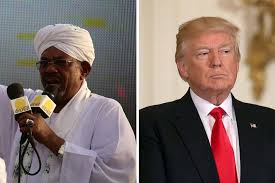Normalization of American-Sudanese Relations is Pointless
Sudan's foreign ministry reportedly wants to resume normalization talks with the United States. American-Sudanese relations have been extremely strained since 1997, in retaliation for Sudan's co-operation with Al-Qaeda. In 1998, the US went so far as to attack a Sudanese factory, believing that the factory was supplying Al-Qaeda with chemical weapons. In 2007, President Bush implemented new sanctions on the Sudanese government in retaliation for Sudan's co-operation in the Darfur genocide. However, in October of 2017, the US lifted all sanctions on Sudan, in part because the situation in Darfur had largely improved, but mostly because Sudan had cut off all ties with North Korea.
Full on normalization, however, is a different matter. Sudan is still ruled by the despotic warlord Omar al-Bashir, and the war in Darfur is still ongoing. Moreover, Sudan has extremely strained relations with Chad - one of America's most important African allies. Sudan has also aligned itself with Russia, and is one of China's largest partners in Africa - meaning that it will be nearly impossible to gain Sudan as an ally, given their close relations with Russia and China. Sudan is also, overall, flaky and unreliable in her foreign policy. Sudan was once allied with Iran, until 2016, when Sudan suddenly cut relations with Iran in favor of Saudi Arabia. A few months ago, Sudan proceeded to sign a massive deal with Qatar - at this point, an enemy of Saudi Arabia and the GCC. The Sudanese government is also closely linked with the Muslim brotherhood - a Middle Eastern faction vehemently opposed by Egypt and Saudi Arabia, America's two strongest allies in the Middle East. In particular, tensions between Egypt and Sudan were extremely high earlier this year, over both water supply issues (Sudan supports an Eithiopian plan to build a large dam in the Nile River, which would threaten Egypt's water supply) as well as a border dispute in the Hala'ib triangle, which is controlled by Egypt but claimed by Sudan.
There is also the question of whether it is even worth it to commit to any partnership with Sudan - Sudan is extremely impoverished, with an incredibly corrupt government. It is essentially a failed state, with rebel factions in both the west and the south, as well as a raging civil war in its southern neighbor, South Sudan. Furthermore, as mentioned earlier, Sudan would be a flaky partner - it appears that they can be bought out by any nation for a short-term alliance, rather than commit to any long-term partnership. Sudan is also unstable - it has had four military coups in its relatively short history, and it is not clear who really runs the country - whether it is run by the military or by Islamists.
Normalization of ties with Sudan brings essentially no net benefit to the US. Strategically, strengthening ties with Sudan would likely alienate Egypt and Chad, which together are far more important as American allies when compared to Sudan. There isn't even a moral argument for normalization with Sudan either - it is still a genocidal, authoritarian, Islamist regime, and there is no indication that Sudan will liberalize any time soon. Instead of normalizing with what is essentially an autocratic pariah of a failed state, the US needs to focus on building alliances with other partners in Africa - Chad, Egypt, Mali, and Kenya come to mind. It is impossible to build good relations with every country on Earth, and the reality is that good relations with Sudan are ultimately detrimental to American foreign policy in the Middle East and Africa.



Comments
Post a Comment